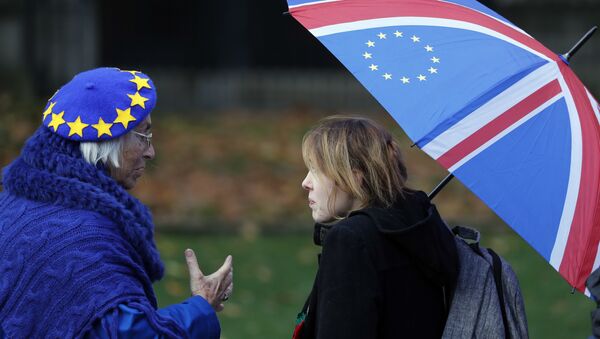Sputnik: What’s your take on the political connotations that's left within Parliament in the forthcoming weeks, because it’s just a complete stalemate, isn’t it?
Alex de Ruyter: The deal the EU said clearly that the withdrawal agreement is final and that any further changes would only be technical, if anything. I think one area that might be easy to change, if they were so inclined, might be the political statement on the future partnership which, of course, might be amended to something more palatable to the so-called Brexiteer Conservative MPs, but that document, of course, is not legally binding. So probably it wouldn't be sufficient to placate would-be parliamentary rebels.
READ MORE: Just 19% of Brits Think PM May's Brexit Deal Honours 2016 Referendum – Poll
Sputnik: Why has the prime minister retreated at this crucial point and gone to Brussels to discuss the deal? How much is her deal responding to the Brexit people that they voted for, what’s your particular take on this? Because, obviously, from her Lancaster gate strategic presentation then the Chequers presentation, to the actual Brexit deal that she's negotiated it’s very much a watered down Brexit negotiated agreement. It’s not a soft Brexit, it’s a super light one, isn't it?
Alex de Ruyter: Yes, it’s very interesting as you say to go back to that Lancaster House speech where Theresa May's red lines were no jurisdiction for the Court of Justice of the European Union, no membership in the single market, no customs union, control of our borders, control of migration and, indeed, I think if you look at the process of Brexit over the last two years in terms of negotiations, the negotiations clearly haven't been so much with the EU as they have been with her own party. And if one were to credit her with some kind of strategic intent it may well be that she envisaged this whole process as dragging them into the direction of a so-called soft Brexit, but on the other hand, I'd probably just refer to it as just being an exercise in party management without necessarily inferring that.
Sputnik: Do you think we’re going to have a second referendum? Is that really going to happen to stop Brexit?
Alex de Ruyter: I think what is clear is, that there doesn’t appear to be a majority in the UK parliament for any kind a deal that Theresa May could negotiate. Equally so, there’s clearly no majority in parliament for a no deal. So we're left for what kind of scenarios one can possibly pursue as an alternative to what she has on the table. There's been some talk of a Norway plus option which would keep the UK in effect in the European economic area, in the customs union, it would then have to abide by freedom of movement, it would have to maintain close regulatory alignment with the EU, that sort of setup could be Brexit in name only. How feasible that is, of course, is open to question, whether European economic area members or EFTA would agree to it. The fact that it would still come with a withdrawal agreement to be negotiated and the continued operation of the Northern Ireland backstop, all those things remain contentious which makes that a bit problematic.
Sputnik: You're the Director of the Centre for Brexit Studies at Birmingham City University, I’m supposing you've never been so busy in all your life in terms of all the different elements, the aspects, the connotations to this, it must be a fascinating job and role to be doing at the moment. So within your role as the Director of this Centre for Brexit Studies what’s the outcome that you foresee as the most probable now within this Brexit saga or don't you have a view? Are you going to take the Fifth Amendment?
Alex de Ruyter: What do I see as the most probable? Well, obviously, it’s only a possibility; I think the most probable outcome may well be another referendum now. Theresa May’s said she’s dead set against that, the crux, of course, comes in to what extent the Parliament propose alternatives to May's deal, now there’s where we run into a bit of a problem. It’s one thing for the parliament to propose amendments, but the government has to act on them, and without any extension to the Article 50 period in the offing then time is clearly running out. So whilst another vote maybe probable I wouldn’t rule out no deal.
The views expressed in this article are those of the author and do not necessarily reflect those of Sputnik.





